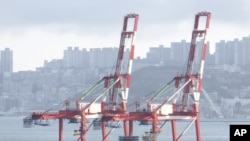A top U.S. trade official has told lawmakers that the Obama administration is ready to move forward with a free trade agreement with South Korea, an agreement he says will help the U.S. keep its edge in international trade and boost jobs at home.
Deputy U.S. Trade Representative Ambassador Demetrios Marantis says that after Congress approves the long-awaited agreement, it will help create thousands of U.S. jobs and more opportunities for U.S. businesses overseas.
"The U.S.-Korea Free Trade Agreement will strengthen U.S. trade and investment ties to Korea's $1 trillion economy. It will bind a key ally closer to us, anchor our economy to the dynamic Asia-Pacific region and help us keep our edge over international competition," Marantis said.
The original agreement was approved in 2007, during the administration of George W. Bush. President Barack Obama's administration has worked to address concerns with the deal that were brought up after it was signed.
The U.S. auto and beef industries had complained that the deal did not go far enough to protect their interests.
On Thursday, Marantis told the House Ways and Means Committee that the Obama administration signed a re-negotiated deal with South Korea in December following extensive consultations with a wide range of concerned groups and lawmakers.
"The U.S. Korea trade agreement is ready to move today. The president and many of you had serious concerns about the deal signed in 2007, we heard you and we took action," Marantis said.
Lawmakers told Marantis that they look forward to getting a copy of the agreement and moving it through Congress. It is not certain when it will come to a vote, as some Republican lawmakers have said they want to consider it at the same time they debate trade deals with Colombia and Panama. Those agreements, however, are not as far along in the negotiation process and some of Mr. Obama's fellow Democrats have reservations about them.
Marantis says improvements in the deal help create a more level playing field for the U.S. auto industry and address concerns about non-tariff barriers in South Korea's auto market such as environmental and safety regulations.
He says that once lawmakers in the U.S. and South Korea approve it, the agreement will promote green technologies by immediately cutting South Korean tariffs on U.S.-made electric cars and completely eliminating them after five years.
Marantis says a tariff structure was negotiated that gives U.S. auto companies more opportunity to build up their business in South Korea before tariffs in America come down. The deal, he says, will unlock the economic potential of the 2007 agreement for a range of American industries.
"Immediately upon entry into force, this agreement eliminates tariffs on two-thirds of U.S. agricultural exports to Korea. Within five years of entry into force, it removes on over 95 percent of consumer goods exports," Marantis said.
The United States is under pressure to get the agreement approved as soon as possible because the European Union has already signed a free trade deal with South Korea that goes into effect in July.
Industry experts say the United States needs the deal - its biggest trade pact to date - not only because of the EU agreement but also because Chinese companies are outpacing American exporters in South Korea and elsewhere in Asia.
Thomas Hubbard is the senior director for Asia at McLarty Associates, an international trade and business consulting firm, and a former ambassador to South Korea. Hubbard told lawmakers that while the United States was South Korea's biggest trading partner in 2003, it has now slipped to fourth, with China taking the lead.
"If you go around the East Asia region you will find that China has moved into first place almost everywhere you look. And they [other countries in East Asia] are uncomfortable with that. The other countries of Asia are looking to this agreement as an indication of whether the United States is committed to the region," he said.
Hubbard says that countries in East Asia are looking to see if the United States will continue to lead in promoting trade liberalization. He says that countries in Asia will see speedy approval of the South Korea trade agremeent as a sign of Washington's continued commitment to the region.
US Cites Benefits of New Trade Agreement with South Korea










